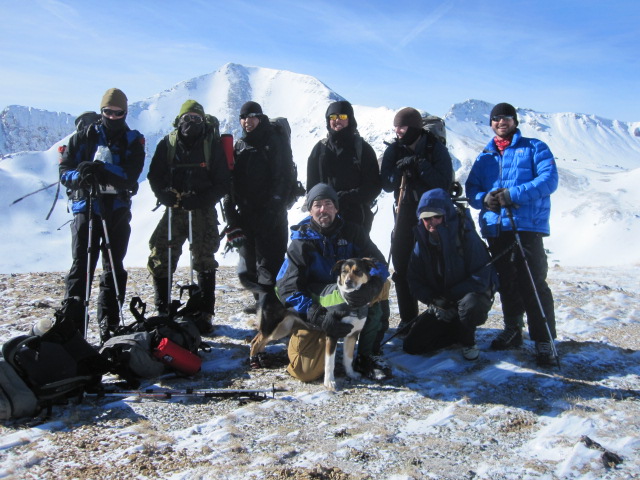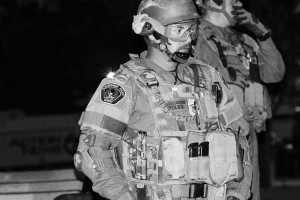REPRINTED FROM THE ALIBI
By the time President Obama took office in 2008, we knew that everything the Bush administration said in its pitch for war against Iraq was lies.
We’d learned that Saddam Hussein had no connection to al-Qaida and nothing to do with 9/11; that he did not have nuclear capability and was not on his way to becoming a nuclear power; and that he no longer possessed biological or chemical agents.
Assisted by a pliant and largely passive press, the Bush administration managed to spin up a war in the fall of 2002, in newspapers, on talk shows and during presidential briefings in which we were told, point blank, “Iraq is part of the war on terror.”
They frightened us with horrible images, warned us of the lethality of even a single drop of Hussein’s chemical stores. In an October 2002 speech, President Bush stressed the growing threat of a nuclear attack and the danger of waiting for a smoking gun to “come in the form of a mushroom cloud.”
We were fooled. Fooled into a nine-year debacle that has cost us nearly a trillion dollars, stretched the limits of our military and inflicted untold suffering upon thousands.
The end to the war has been declared. But the declaration hasn’t been that important. A private army of contractors remains in Iraq, funded in part by the $6 billion 2012 budget of the U.S. Embassy in Baghdad. So is the war really over?
Though we grieve for the dead, what about the living? What about the thousands of widows and orphans? The thousands of soldiers savaged by roadside bombs, filling the orthopedics ward, the neurosurgical unit, and the psychiatric outpatient department? In 2010 alone, tens of thousands of soldiers were medicated on $280 million of mood stabilizers, antidepressants and sleep aids: Prozac, Paxil, Zoloft, Celexa, Effexor, Valium, Klonopin, Wellbutrin, Ativan, Restoril, Xanax, Adderall, Ritalin, Haldol, Risperdal, Seroquel, Ambien, Lunesta, Elavil and Trazodone.
And then there is this to consider: the fear and loathing we have fueled in the Middle East by an occupation that has lasted nearly a decade.
Is the Iraq occupation so different from other military occupations in world history? Here is an example from my own family. Within 10 hours of the military strike on Pearl Harbor, the Japanese attacked the Philippines and began a period of brutal military occupation that lasted from 1942 to 1945. During this period, an estimated 1 million Filipinos were killed.
My father, born on the island of Luzon in 1925, was part of the insurgency that rose to resist the invaders. On his birthday—which he celebrated recently with two of his sisters visiting from California—he wished for “peace all over the world.”
But he is unusual. My auntie’s position is more typical.
“You still hate the Japanese, don’t you?” she asked me at the table. She is older than my father, nearly 90, and she is not done hating the Japanese for the misery they inflicted half a century ago.
Although she is a slight woman, probably no more than 80 pounds, I can tell there is some strength in her, and she would spend her last reserves scratching out the eyes of a Japanese soldier. A devout Catholic who has traveled at times with a 3-foot Virgin of Lourdes statue, she is sure that the tsunami that devastated Japan in March was sent by God to punish them.
This is the kind of hatred that wars rely on and propagate.
I have seen my auntie’s wrath echoed in the eyes of the Iraqis during my year in Iraq. I have seen the hatred in their eyes as we invaded their homes and scattered their belongings, as we manhandled them at checkpoints, as we terrorized them.
How many al-Qaida sympathizers have we created over this near decade of occupation and violence? How many terrorists have we given birth to by prodding their loved ones with spears, by blowing up their countryside and cities, by killing their parents?
Paul K. Chappell, a fellow Army captain, West Pointer and Iraq veteran, wrote a book called The End of War: How Waging Peace Can Save Humanity, Our Planet, and Our Future. As the son of a veteran of both the Korean and Vietnam Wars, and witness to his father’s emotional struggles, Paul was exposed to the tragedy of war at an early age. In his book he argues that we cannot afford to passively accept the decisions of our government to lead us into conflict. Here are his guidelines for when we must stop and question our decision-makers:
• The more lives there are at risk, the more important it is for us to question.
• The more profitable something is, and the more a few people stand to gain, the more important it is for us to question.
• The more someone advocates violence, fear and hatred, the more important it is for us to question.
When we most needed to question our highest officials about their claims of Iraqi threat to our national security, we failed.
Regrettably, I did not begin to question the Iraq War until 2005, when my commander, Col. Ted Westhusing, in despair over the corruption and human rights abuses taking place, went to his trailer at Camp Dublin and shot himself in the head.
Not only did I fail to question the Iraq War, I even watched with some degree of martial pride as the bombs and missiles began to strike Baghdad on March 20, 2003. Like millions of other Americans, I was suckered by the terror propaganda presented by the Bush administration.
How could they have focused on the profit of war and not its cost? How could they have thought only of the lucrative contracts and not of the bodies? Maybe none of them knew the words of the poet Donald Hall: “You think that their dying is the worst thing that could happen. Then they stay dead.”
Somehow the country fell into the hands of not just war criminals but bumbling war criminals. They had their way largely because the military, far from being a democratic cross-section of our youth, is populated with the offspring of the poor and the working class, not the children of privilege and influence.
Ask the headmasters of our nation’s top boarding schools, which educate the rich and powerful for $40,000 a year, what personal sacrifice their respective alumni have made in the wars in Iraq and Afghanistan.
In his article “Class Warfare,” Josiah Bunting III, president of the Harry Frank Guggenheim Foundation and himself a former headmaster, presents the record of one of this country’s most prestigious but unnamed boarding schools. During WWI, 40 of its 400 students died in the military. During WWII, the number was 60. There were 10 during the Korean conflict, five for the Vietnam War, and so far, none in Iraq or Afghanistan.
If you place a call to Phillips Academy (annual tuition $42,350), officials will inform you that although none of their alumni count among the nearly 4,500 dead, the school does have the distinction of having graduated the individual responsible for launching the war, George W. Bush. President Bush would go on to avoid service in Vietnam by joining the Texas Air National Guard.
His second in command, Vice President Dick Cheney, received five deferments during the Vietnam years. Later in life, when questioned about these deferments, Cheney famously remarked that he had “other, more important things to do.”
A list of influential Americans who have bought their way out of military service can be found in Howard Zinn’s book A People’s History of the United States. During the time of the Civil War, this list included J.P. Morgan, John D. Rockefeller, Andrew Carnegie, Philip Armour and Jay Gould.
James Mellon is also on that list. His father wrote to him that “a man may be a patriot without risking his own life or sacrificing his health. There are plenty of lives less valuable.”
This abdication of personal responsibility on the part of the wealthy and influential of this country has allowed the rest of us to be led into wars “not fought for national security, but wars that are put into place for political or policy reasons rather than out of any real necessity.”
That is how Dr. Ronald Glasser, a Vietnam veteran drafted in 1968, characterizes the Iraq War in his book Broken Bodies, Shattered Minds: A Medical Odyssey from Vietnam to Afghanistan. He writes that in political wars, winning is hard to define and victory is a distant illusion. “Political wars usually end by everyone simply losing interest. Eventually, the tedium and casualties and the loss of treasure become too great to ignore, and the wars are simply abandoned and closed down while everyone pretends it wasn’t that important.”
I am still searching for the mock U.S. destroyer in the lake, the destroyer that Iraqi commandos were reportedly training to attack. I encounter it in my dreams, a sloppy structure built of lumber and Styrofoam, only partially afloat. Where are the Iraqis? They are running in the shallow water, shouting loudly at one another. One throws down a rope from above to a small group gathered below. There is a disagreement over who is to climb first. There is some pushing and shoving.
Two attempt to start climbing at the same time. I can’t help smiling, even though I am there to kill them. Several times I raise my rifle and take aim. It isn’t until they have all made it up the rope and are balancing on the narrow beam that I find myself lowering my rifle, unable to shoot, unable to do the bidding of my country any longer.



